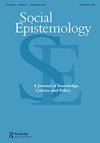认知包容是受益于科学认知多样性的关键
IF 2
2区 哲学
Q1 HISTORY & PHILOSOPHY OF SCIENCE
引用次数: 0
摘要
在整个科学史上,主流科学忽视不那么杰出的研究人员的新观点的案例屡见不鲜。如今,许多具有不同社会和学术背景、出身和性别认同的研究人员共同研究至关重要的课题。但是,特权阶层是否会充分考虑弱势阶层同事的意见,还是个问题。为了从思想的多样性中获益,科学界首先必须对少数观点持开放态度,并在认识论上将它们纳入主流研究。此外,包容性科学的理念比开放科学的范式提出了更强的要求。我们认为,整合不同意见的概念是不够的,因为整合的过程假设自己调整到多数观点,并适应主导范式,同时只做出较小的修正。另一方面,认知包容意味着在与多种方法和假设的互动中动态改变研究范式。包容的过程保留了边缘化的观点,增加了认识的公正。本文章由计算机程序翻译,如有差异,请以英文原文为准。
Epistemic Inclusion as the Key to Benefiting from Cognitive Diversity in Science
Throughout scientific history, there have been cases of mainstream science dismissing novel ideas of less prominent researchers. Nowadays, many researchers with different social and academic backgrounds, origins and gender identities work together on topics of crucial importance. Still, it is questionable whether the privileged groups consider the views of underprivileged colleagues with sufficient attention. To profit from the diversity of thoughts, the scientific community first has to be open to minority viewpoints and epistemically include them in mainstream research. Moreover, the idea of inclusive science poses stronger requirements than the paradigm of open science. We argue that the concept of integration of different opinions is insufficient because the process of integration assumes adjusting oneself to the majority view and fitting into the dominant paradigm while contributing only with smaller amendments. Epistemic inclusion, on the other hand, means dynamically changing the research paradigm during the interaction with diverse methods and hypotheses. The process of inclusion preserves marginalized views and increases epistemic justice.
求助全文
通过发布文献求助,成功后即可免费获取论文全文。
去求助
来源期刊

Social Epistemology
Multiple-
CiteScore
2.60
自引率
17.60%
发文量
60
期刊介绍:
Social Epistemology provides a forum for philosophical and social scientific enquiry that incorporates the work of scholars from a variety of disciplines who share a concern with the production, assessment and validation of knowledge. The journal covers both empirical research into the origination and transmission of knowledge and normative considerations which arise as such research is implemented, serving as a guide for directing contemporary knowledge enterprises. Social Epistemology publishes "exchanges" which are the collective product of several contributors and take the form of critical syntheses, open peer commentaries interviews, applications, provocations, reviews and responses
 求助内容:
求助内容: 应助结果提醒方式:
应助结果提醒方式:


